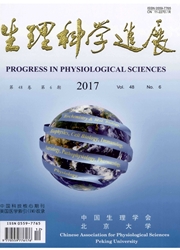

 中文摘要:
中文摘要:
抗菌肽是一类来源于多种生物、能有效杀灭病原体的小分子多肽,具有活性谱广、作用强且迅速、不易产生耐药等众多优点。作为新一代抗感染候选药物,抗菌肽的作用机制还未完全清楚,但目前有两种观点已得到公认,即胞膜渗透作用破坏胞膜结构完整性和作用于胞内不同靶点干扰细菌生长及代谢平衡。本文主要就抗菌肽理化性质、二级结构、作用机制以及后两者间的关系做一总结,以便更好的理解抗菌肽的构效关系,为合理设计抗菌肽提供理论基础。
 英文摘要:
英文摘要:
The antimicrobial peptide is a class of small molecule peptide derived from a variety of creatures,able to kill the pathogens efficiently and has the potential of broad-spectrum activity,rapid and strong bactericidal activity,low propensity for resistance development,and many other advantages.As a new generation of anti-infective drug candidates,the mechanism of antimicrobial peptides has not yet entirely clear,but now there are two views have been widely recognized that the destruction of permeation through the membrane structural integrity and through the different intracellular target to affect bacterium growth and metabolic balance.In this paper,the physical and chemical properties,secondary structure,mechanism,and the relationship between the latter two to make a conclusion,in order to better understand the structure-activity relationships and to provide a theoretical basis for rational design of antimicrobial peptides.
 同期刊论文项目
同期刊论文项目
 同项目期刊论文
同项目期刊论文
 Antisense inhibition of gene expression and growth in gram-negative bacteria by cell-penetrating pep
Antisense inhibition of gene expression and growth in gram-negative bacteria by cell-penetrating pep Underlying mechanism of in vivo and in vitro activity of C-terminal-amidated thanatin against clinic
Underlying mechanism of in vivo and in vitro activity of C-terminal-amidated thanatin against clinic 期刊信息
期刊信息
